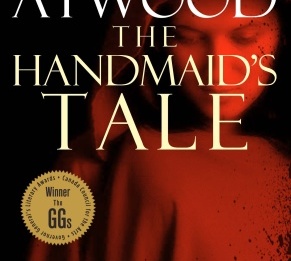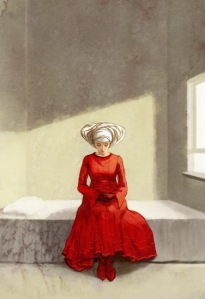Take a look at your bookcase. If you had enough free time, which book would be the first one you’d like to reread? Why?
The Handmaid’s Tale by Margaret Atwood is a dystopian novel describing the lives of its citizens after the fall of now-America into a military state (“The Fall”). Having read it as a teenager, it was ingrained in my mind for a long time. I remember the strange names of characters and the graphic sexual images. It was both frightening and arousing – frightening, because of the stripping of women’s rights, the categorising of women based on their reproductive ability and sexual history, the environmental destruction of America by nuclear waste and the rise of an authoritarian military regime. Arousing, because it describes (among other sexual scenes) a controlled and fully clothed threesome “ceremony” that happens between the protagonist, her Master and his wife – to a young teenager this was interesting, however wrong it also was.
But that was over a decade ago. I don’t remember the names, apart from Offred who is the woman who becomes the Handmaid of Fred, a high-ranking commander in the military regime. For those who haven’t read the book, Handmaids are chosen based on their ability to bear children, but made a Handmaid because of some sexual indiscretion on their part in the past. Before The Fall, Offred married a divorcee – that was her indiscretion. She also had a daughter from that marriage, who was deemed illegitimate because she was born out of “adultery” – not of a first time marriage for Offred’s then-husband.
The other women categories included the barren Marthas, who did housework and managed domestic affairs; the Wives, who were “proper” but often also barren women and wed to commanders like Fred, and another group which I forgot. The Wives and Marthas saw the Handmaids as slutty, maybe because they were the only ones who could have legitimate sex, if you can call the ceremony as sex at all.
There are strong religious references in this novel, namely the rise of fundamentalist Christianity and a literal interpretation of the Bible, especially the old testament. There are also projections of what the future holds – nuclear wastelands, strict class division, the breakdown of democracy, excessive violence and the annihilation of women’s rights.
I would reread this novel had I the luxury of time. No longer the angsty teenager with over-active hormones, my focus would no longer be on the strangeness or the sex, but more on the social commentary the novel is trying to make. I’d focus more on the intelligent use of character naming and word construction and less on the violence. I’d also better understand the Biblical references, having studied the Bible in an academic context in my adult years. It would also be interesting to see how some of Margaret Atwood’s predictions are not entirely off the ballpark. We live in times where women’s rights are progressing in certain countries, but regressing in some. We live under democracies and religious freedom but the majority of the world does not. We have clean water from taps and don’t worry about nuclear radiation, but there are those who trek miles for a litre of water and have no choice but to live in the midst of dangerous waste and pungent fumes. We do not fear our own military, but there are those who pray everyday that their daughters and sons are not abducted by soldiers or guerrilla. Margaret Atwood could be the most outrageously wrong, depressing cynic, or she could be a clairvoyant. My reread of the book would give me a different perspective this time around. There would be a sense of urgency now because the novel’s events relate to reality. It is no longer a fictional outlandish piece of work. The balance between good and evil is more fragile than we think. If we aren’t careful, if we don’t fight, our world could very well become one similar to The Handmaid’s Tale in the near future.
– post inspired by Daily Prompt
Feature image credit booksend.wordpress.com


I adore Margaret Atwood!! Her latest dystopian series, Madaddam, was really good. It’s also being turned into a miniseries on HBO.
LikeLiked by 1 person
I adore her too. She’s so wise and her writing so good. I haven’t read the Madaddam series yet but thanks for the suggestion! Will check it out.
LikeLike
Oryx & Crake was the first one. Very good.
LikeLiked by 1 person
Oh yes, that one I read when it first came out. I remember feeling very sad at the ending, but everything came together and made sense. I’m guessing the following books explain Oryx & Crake in more detail?
LikeLike
This could be an interesting format for book reviews in general – what sticks with you from a book you read many years ago?
For me the details from the Handmaid’s Tale (apart from the overall setup) that I recall… using butter as handcream; the lady of another house assuming ownership of her handmaid’s newly-born baby; the other handmaid on daily walks who seemed so orthodox and turned out to be in the underground – the isolation of mutual distrust.
LikeLiked by 1 person
My, inconspicuouscreation, do you have an excellent memory. I find it intriguing, the minute yet important details you remember. I don’t remember the butter as handcream but I do recall the forbidden everyday items of now, like vogue magazines and lipstick. The mutual distrust is indeed an overarching theme – the breakdown of societal values, the self-censorship and surveillance through dividing people into classes. Not unlike societies/eras that existed in the past or present – like communist China during the Cultural Revolution and today’s North Korea.
LikeLike
LikeLike
Pingback: Blogamorphasis: what the pixiedustbeach blog is slowly morphing into | Pixie Dust Beach
Pingback: Book Review: The Happiness of Pursuit | Pixie Dust Beach
Pingback: Interstellar: Movie Review | Pixie Dust Beach
Pingback: Book Review: The Life Changing Magic of Tidying Up | Pixie Dust Beach
Pingback: 2 Easy Things We Can Do Now To Save Ourselves: Quitting Plastic | Pixie Dust Beach
Oh I am definitely longing to read this (not re-read). I’ve only read one of her book, “Penelopiad” and it immediately made conclude that I definitely want to read everything she write. She’s a great one and I agree she is wise.
LikeLiked by 1 person
I haven’t read Penelopiad but it’s on my list now! What did you like about it? I’ve only read her other one, Oryx and Crake, and really liked it though it’s very dark. Indeed she is very wise and has a way with words and creating new words.
LikeLike